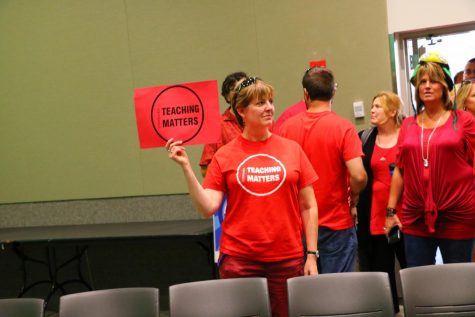Will stalled teacher contract negotiations result in a strike?
August 29, 2019

Marching and chanting in solidarity, College of DuPage teachers and community supporters stormed the Aug. 15 board of trustees meeting to let members know the impasse in union contract negotiations have them seeing red.
Clad in scarlet attire reading, “Teaching Matters”, teachers hoisted signs asking, “How do you put students first if you put teachers last?” Another sign satirically remarked, “Frida Says Teaching Matters”, highlighting the faculty’s concerns that hosting prestigious events like a multi-million dollar Frida Kahlo painting exhibit matter more to certain members of the board than the well-being of the teachers.

Squeezing the 200-plus crowd through the college’s front doors, members of the COD Faculty Association and the statewide-union, Illinois Education Association, shouted, “They say cut back. We say fight back.”
One union supporter even brought along a husky donning a red bandana in hopes the board listens to the teachers’ demands and contract negotiations don’t go to the dogs.
Following seven months of failed bargaining, the Faculty Association’s current contract expired on Aug. 14. Right before the protest, the board agreed to the union’s request to use an independent federal mediator beginning Aug. 27.
With the potential to disrupt Fall semester courses, CODFA has threatened to strike if their demands are not met.
A week after the protested board meeting, Director in Communications Wendy Parks released in a statement, “The College Administration’s (recent counter-proposal) offers a highly competitive economic proposal that addresses CODFA’s demands while fairly balancing the fiscal obligation to the taxpayers of District 502.”
Their new proposal includes mandatory in-class evaluations for all full-time faculty involving College Deans as faculty supervisors. Parks argued such evaluations are implemented across many other college institutions. The new proposal also recommends a new teacher promotional structure to ensure improvement in teaching.
Shannon Toler, professor of Business and president of the Faculty Association, addressed the need for solidarity in protecting teacher’s rights.
“Many of our full-time faculty have had wages frozen for the last three years and starting salaries for new full-time faculty have also been frozen,” said Toler. “Our proposal is in line with both national and DuPage County wage growth data. Our instructional proposals take into account our successful track record, yet also address key challenges communicated by the administration.
“CODFA does not want to go on strike. We are concerned about the negative impact a strike would have on students and COD as a whole.”
Toler said in the event of a strike, classes by full-time faculty would not be taught, while classes taught by adjunct faculty would be expected to continue. She said any student refund questions should be directed to the COD Administration.
Highlighting the potential for unaware students to be negatively impacted, student Becca Duncan said of her five classes, none of her professors have mentioned anything about the contract negotiations or the possibility of a strike and interrupted classes.

“Because they have not mentioned anything, I have assumed the problems are being resolved,” said Duncan. “I am nervous a teachers’ strike could result in fall semester classes being canceled. If this happens, my ability to complete the credits for an Associate’s degree will be delayed and I will not be able to transfer. Not being able to complete classes this semester would affect thousands of students, like myself, who are trying to save money by attending community college before transferring to a four-year university.”
During the protested board meeting, teachers took turns arguing excellence in education begins with excellence in teaching. Board President Frank Napolitano was absent from the night’s events. He later remarked in an online post the board was “under attack.”
“Every stakeholder deserves a fair outcome – faculty and staff, students and the taxpayers who endow this school with their hard-earned money,” wrote Napolitano.
Professor of Mathematics Eric Hauenstein spoke to the board on behalf of seasoned colleagues who taught 15 or more years at the college. He described teachers, like himself, devoting the prime of their lives and always giving the best to the college and their students.
“Many of my colleagues, including myself, have endured a stagnant yearly income, earning less now than six to 10 years ago, while not only performing the same duties but being asked to take on more,” said Hauenstein. “Our out-of-pocket health care costs continue to rise (and) the cost of living has steadily risen.”
Hauenstein argued in an affluent district with consistent tax support, the failure to properly compensate teachers brings tarnish to the college’s reputation like the past loss of HLC accreditation and the recent athletic probation.
“We can’t understand why the board’s negotiation team has chosen to take such an antagonistic and adversarial role,” said Hauenstein. “Long-time experienced faculty (feel) the board doesn’t value our extended tenure and would rather replace us with a newer, cheaper model.”
Jackie McGrath, English professor and vice president of the Faculty Association, called on board members to find a pathway for settling the contract.

“At COD, administrators come and go. Board members come and go. Students pass through for a short time, but faculty and staff are here through thick and thin,” said McGrath.
McGrath expressed dismay at the board’s decision to advertise over 100 part-time 12-week positions shortly before the beginning of the 16-week semester. Newly hired adjunct positions would be used to cover the classes of full-time faculty in the event of a strike.
Prior to the meeting, McGrath called the Adjunct Association extraordinary and courageous for overwhelmingly voting to reject the board’s lucrative contingency offer.
Professor of Political Science Melissa Mouritsen told the board without her own community college experience as a student, and the impact of a crucial history professor, she wouldn’t be doing what she’s doing today. She said similar to that teacher, she is uniquely qualified to teach and change the lives of the school’s students.
“I am surrounded by people just like me who are as educated, committed and uniquely qualified,” said Mouritsen. “Thousands of part-timers and hundreds of full-timers have real-world experience and expertise. We are the product. We are the reasons students come to learn from us. Student outcome, success, retention and completion, are not just graphs or campaign slogans (to) us, it is our life. It is what we eat, breathe and sleep.
“We are not disposable, cannot be replaced by 94 or 160 random individuals. We won’t be intimidated by your attempts to co-opt the adjunct and turn them against us. Our working conditions are our students learning conditions.”
Professor of History Sam Mitrani questioned why the board would risk aggressive actions such as trying to hire replacement teachers when the result will be a decline in the expertise level of faculty provided for the students.
“(The actions) seem designed to provoke an entirely avoidable labor dispute,” Mitrani told the board. “They also seem designed to demoralize both full and part-time who teach at this school.”
Mitrani said the college can afford a reasonable contract.
“Either a significant number of board members don’t understand the consequences that will flow from these actions, or there are board members who are willing to hurt the college in order to make a name for themselves as anti-teacher and anti-labor politicians.”
Student Bee Casey, a member of Students for a Democratic Society, said at the board meeting coming from a family of teachers helps with appreciating the full credit teachers deserve.
“In terms of supporting the teachers, I see teachers as being a lot more important than the Board of Trustees,” said Casey. “We need them more to run the school. If they’re not getting treated fairly and not getting their contract renewed with benefits and increased pay, I don’t know how comfortable we all feel learning at an institution like this.”


















